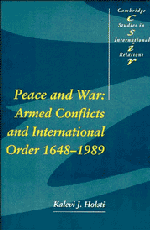Book contents
- Frontmatter
- Contents
- List of figures
- List of tables
- Preface
- 1 ON THE STUDY OF WAR
- 2 MÜNSTER AND OSNABRÜCK, 1648: PEACE BY PIECES
- 3 WAR AND PEACE IN THE ERA OF THE HEROIC WARRIORS, 1648–1713
- 4 ACT TWO OF THE HEGEMONY DRAMA: THE UTRECHT SETTLEMENTS
- 5 THE LETHAL MINUET: WAR AND PEACE AMONG THE PRINCES OF CHRISTENDOM, 1715–1814
- 6 PEACE THROUGH EQUILIBRIUM: THE SETTLEMENTS OF 1814–1815
- 7 CONFLICT AND CONSENT, 1815–1914
- 8 1919: PEACE THROUGH DEMOCRACY AND COVENANT
- 9 WAR AS THE AFTERMATH OF PEACE: INTERNATIONAL CONFLICT, 1918–1941
- 10 PEACE BY POLICING
- 11 THE DIVERSIFICATION OF WARFARE: ISSUES AND ATTITUDES IN THE CONTEMPORARY INTERNATIONAL SYSTEM
- 12 WAR: ISSUES, ATTITUDES, AND EXPLANATIONS
- 13 THE PEACEMAKERS: ISSUES AND INTERNATIONAL ORDER
- References
- Additional data sources
- Index
3 - WAR AND PEACE IN THE ERA OF THE HEROIC WARRIORS, 1648–1713
Published online by Cambridge University Press: 04 February 2011
- Frontmatter
- Contents
- List of figures
- List of tables
- Preface
- 1 ON THE STUDY OF WAR
- 2 MÜNSTER AND OSNABRÜCK, 1648: PEACE BY PIECES
- 3 WAR AND PEACE IN THE ERA OF THE HEROIC WARRIORS, 1648–1713
- 4 ACT TWO OF THE HEGEMONY DRAMA: THE UTRECHT SETTLEMENTS
- 5 THE LETHAL MINUET: WAR AND PEACE AMONG THE PRINCES OF CHRISTENDOM, 1715–1814
- 6 PEACE THROUGH EQUILIBRIUM: THE SETTLEMENTS OF 1814–1815
- 7 CONFLICT AND CONSENT, 1815–1914
- 8 1919: PEACE THROUGH DEMOCRACY AND COVENANT
- 9 WAR AS THE AFTERMATH OF PEACE: INTERNATIONAL CONFLICT, 1918–1941
- 10 PEACE BY POLICING
- 11 THE DIVERSIFICATION OF WARFARE: ISSUES AND ATTITUDES IN THE CONTEMPORARY INTERNATIONAL SYSTEM
- 12 WAR: ISSUES, ATTITUDES, AND EXPLANATIONS
- 13 THE PEACEMAKERS: ISSUES AND INTERNATIONAL ORDER
- References
- Additional data sources
- Index
Summary
We know only too well from sad and frequent experience that predominant States rarely fail to trouble their neighbours, to oppress them, and even to subjugate them completely, when they have an opportunity of doing so with impunity.
Emmerich de VattelI have loved war too much.
Louis XIVThe Peace of Westphalia failed to establish a comprehensive order, but it did include some elements of a hypothetical international order. There was a primitive system of governance (Swedish and French guarantees), the assimilation of the Holy Roman Empire, and in particular, some important territorial allocations that were to provide benchmarks of legitimacy.
Did Westphalia provide important sources of stability for international politics in succeeding decades? The reality probably lies somewhere between Giraud's claim that post-Westphalia Europe constituted “a community of destinies and of interests,” a “system, born of facts but consecrated by law,” (1847:12–13), and Zeller's comment (1955:111, 16) that Westphalia did not reveal “the shadow of a constructive idea,” and that the statesmen and diplomats of the later seventeenth century had no conception of a common good, or of a concern for the future of Europe. Westphalia sanctified anarchy, to be sure, but it also drew a map of Europe that defined the bounds of legitimacy, one that was commonly regarded as drawn for eternity (Rabb 1975:78).
- Type
- Chapter
- Information
- Peace and WarArmed Conflicts and International Order, 1648–1989, pp. 43 - 70Publisher: Cambridge University PressPrint publication year: 1991
- 1
- Cited by



